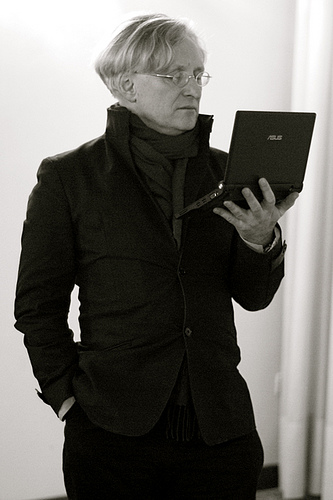

Until the introduction of printing, books were rare, and very, very expensive, maybe something like the same price as a small farm.
Only very rich people, and rich institutions, owned books.
Most books were produced by the church in monasteries.
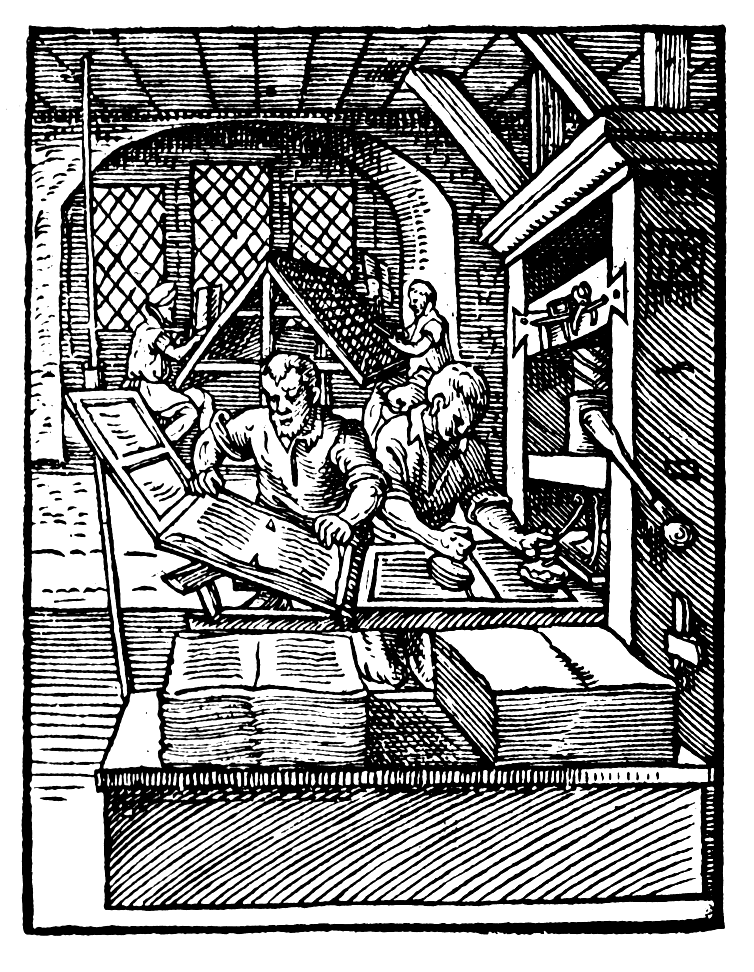 Gutenberg brought known technologies together (just like
the web did): ink, paper, wine presses, movable type.
Gutenberg brought known technologies together (just like
the web did): ink, paper, wine presses, movable type.
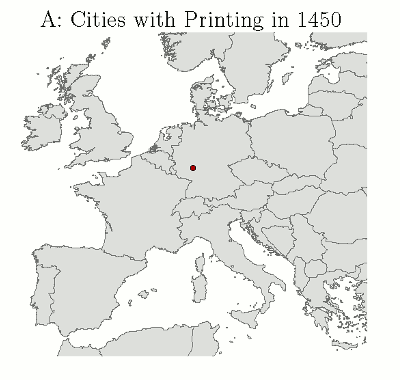
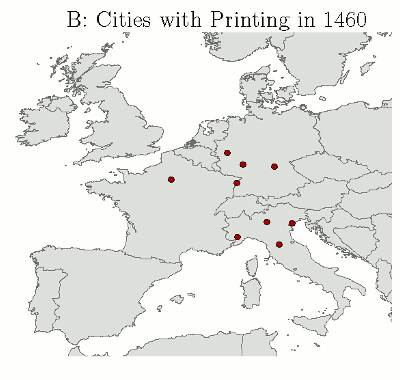
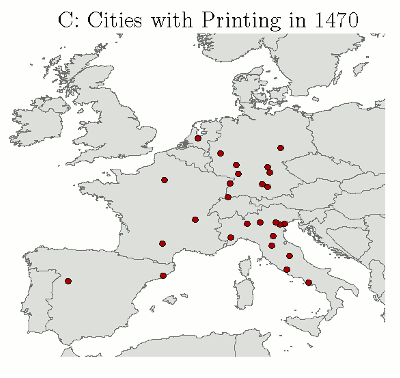
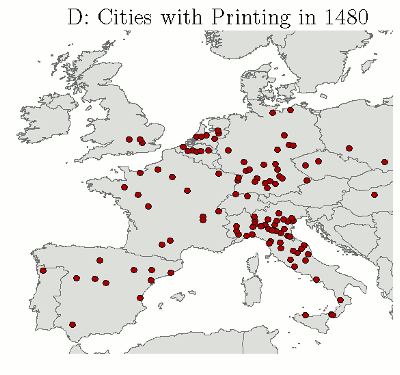
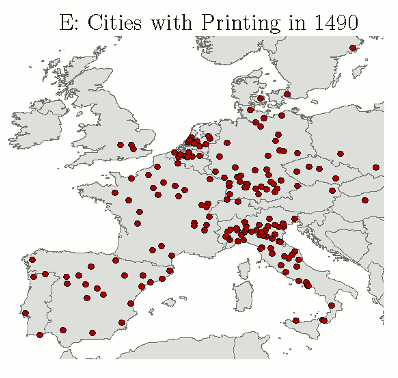
By 1500 there were 1000 printing shops in Europe, which had produced 35,000 titles and 20 million copies.
Price of books greatly diminished (First bible 300 florins, about 3 years wages for a clerk).
Suddenly, the church and state were not the sole providers of information.
Books became a new means of distribution of information.
It was a paradigm shift - new industries, bookshops, newspapers.
Many ascribe the enlightenment to the availability of books, because all of a sudden more people could share information.
But the church and state did not like losing control, and so still tried to influence information flow.
For instance Galileo (1564-1642) had to be very careful about what he wrote. He was condemned to house arrest in 1633 for the rest of his life for suggesting that the earth moved round the sun.
His books were banned until 1741.
The church finally officially admitted their error in 1992 by the way.
"At that time it was common practice for the church and the state to monitor everything that was said, written and printed. This practice is known as censorship. Anyone who dared to criticise the Church, the King and his officials was prohibited from speaking and could even go to prison. In most countries there were many officials who constantly screened everything that was said or written. [...] The enlightenment thinkers were totally opposed to censorship. They wanted the freedom to express their thoughts and ideas."
1665: first scientific journals French Journal des Sçavans and the British Philosophical Transactions.
These were actually different from modern-day scientific journals: they were created to help scientists deal with information overload: So many books were being published, that these provided abstracts, to keep scientists abreast of knowledge, and to help decide which books should be read.
From then on the number of scientific journals doubled every 15 years, right into the 20th century.
In fact around 1825, the first abstract journals appeared, to deal with the information overload of the scientific journals (there were 300 when the first abstract journal was published). The number of abstract journals also increased exponentially.

Even as late as the 1970's if you had said "there has to come a new way of distributing information to support this growth", they would have thought you crazy, more likely expecting the growth to end: there just wouldn't be enough trees to support that many journals.
But now that we have the internet, the amount of information produced continues to increase at an exponential rate (doubling every three years according to one report, every 11 hours according to another).
According to one report, in 2013 3.5 zettabytes of data were produced.
Which is 3.5 × 1021 bytes.
If that were a number of seconds, it would represent 110 million million years.
Which is about 10,000 times the age of the universe.
It's a big number.
So all of a sudden, there is a new method of distributing information, much cheaper, much easier to use, accessible for next-to-no money by everyone.
And of course, the state doesn't like it.
Up until the internet, at least in free democracies, in order to read someone's mail, listen to their phone calls, or come into their houses and read their diaries, the authorities had to get a court order that accepted the need.
Nowadays that has all changed...
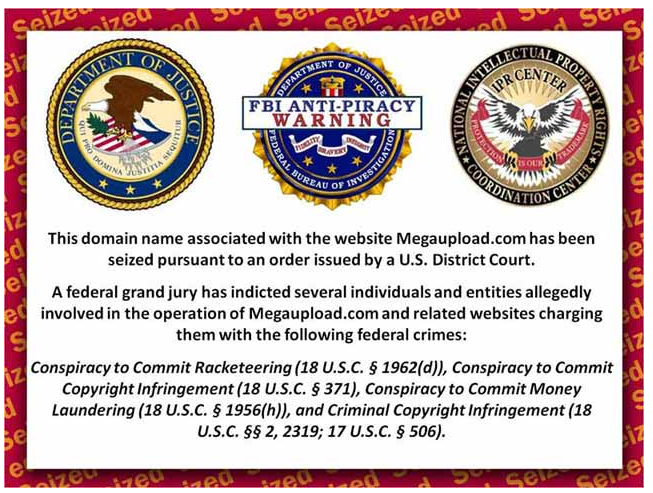
Note that this (non US!) website was shut down, and its assets seized, because it had been accused of US federal crimes. It hadn't even gone to court.
"The US judge handling the case has expressed doubts about whether the case will come to court"
Megaupload was also used by journalists for - anonymously - passing information.
Lavabit was a US-based service offering privacy-guaranteed email.
In July 2013 the US federal government obtained a search warrant demanding that Lavabit give away the private SSL keys to its service affecting all Lavabit users.
However, Lavabit was forbidden from telling anyone about this search warrant.
Lavabit responded by closing down its service. It was also not in a position to tell anyone why it was closing down, though many guessed.
The US authorities had discovered that Edward Snowden used Lavabit, and wanted to read his email.
Commercial interests and criminals are also spying on us.
Via cookies, via profiling...
Lots of things.
An important one: end-to-end public-key cryptography.
This would make a lot of other things better too. Less spam for instance.
Public key encryption allows two things:
For instance, I could order something from a shop by sending a secure message to them. I know that only the shop will read it, and the shop knows it really is from me.
But instead of giving them my credit card number, I give them my credit card number, locked with my private key, and the bank's public key. So the shop doesn't know what my credit card number is, but they can send it on to the bank, and I know that only the bank can read it, and the bank knows that it really is from me.
So the only people who know what my credit card number is are me and my bank (in fact, there is no reason really to have credit card numbers at all in this system because the box can just contain the message "Please pay this shop €20" and the bank knows it is from me).
In fact the shop doesn't even need to know my address for similar reasons.
I could try to log in to a site.
I say "Hi, I'm Steven"
The site says "Oh yeah? Here's a random message. Encrypt that for me".
My browser encrypts it with my private key, the site checks it with my public key, and lets me in.
The internet was designed in an environment where you could trust everybody.
The infrastructure really needs to be redesigned to take away that design fault.
It is time for public-key cryptography to be an underlying part of the infrastructure.
As part of email, it would reduce spam: you would know if a mail really was from your bank.
If ISPs offered it for end-to-end connections, it would mean no one could listen in to your communications (for instance over Wifi).
If done right, it could even do away with the need for passwords.